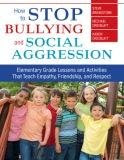Bullying Leads to Massacres is an article discussing human’s innate desire for revenge when they feel wronged. In his book, Beyond Revenge, researcher Michael McCullough discusses how people who have been chronically bullied can go to extremes in their revenge with a shooting rampage. He discusses that this action does not necessarily indicate mental illness.
McCullough discusses how, in general, a breakdown of law and order can lead to hurtful behaviors that create a revenge factor for those who feel wronged. Bullying in school or the workplace, when allowed to fester, is also a breakdown of law and order. McCullough goes on to discuss solutions, of which many have to be implemented. I like to focus on solutions, too.
Stopping bullying and social aggression in school takes the efforts of all people involved – student, staff and parents. It begins with leadership. School leaders need to make sure that bully prevention strategies go beyond the rhetoric of “No Bullying.” A good beginning is to make sure all are on the same page of what bullying is and what behaviors are considered bullying.
Bullying is when a person or group uses their power to intimidate or hurt another. Bullying can be expressed physically, verbally, socially and technologically (cyber bullying). All types of bullying are damaging and must be stopped. Not all people are aware of these definitions and descriptions. Depending on gender, age, area of upbringing (city, suburban, rural), experience with bullying, experience with domestic violence, etc. can influence how a person interprets these behaviors. What is “no big deal” to one person can be devastating to another. It is vital that school leaders make sure all students, parents and staff (administrators, teachers, bus drivers, janitors, counselors, nurses, volunteers, etc.) know what bullying is and their responsibility if they witness or know about bullying.
Staff needs to know how to respond if they witness or hear about bullying. Students need to know how to stop their peers from bullying and, if necessary, when to report it. Parents need to know the signs if their child is bullied or bullies and how to work with the school to make sure their child is safe and treats others respectfully. Discussion, lesson plans and workshops discussing these issues are vital and fulfill education guidelines. In some states, it is required by law. Ultimately they increase academic success.
Getting everyone on the same page is a vital aspect to stop bullying. Recognizing and stopping bullying leads to understanding community expectations and moral obligations. Unfortunately, it is not an exaggeration to say that when people allow others to hurt and abuse others, it comes back to haunt us all. Fortunately, a school massacre is rare, but the negative effects of allowing others to be hurt, hurts us all.
If all involved parties do their part to stop bullying, perhaps we can prevent another school massacre,
There are lots of bully prevention ideas. We’d like to hear some of yours.
Steve
Subscribe to:
Post Comments (Atom)



No comments:
Post a Comment